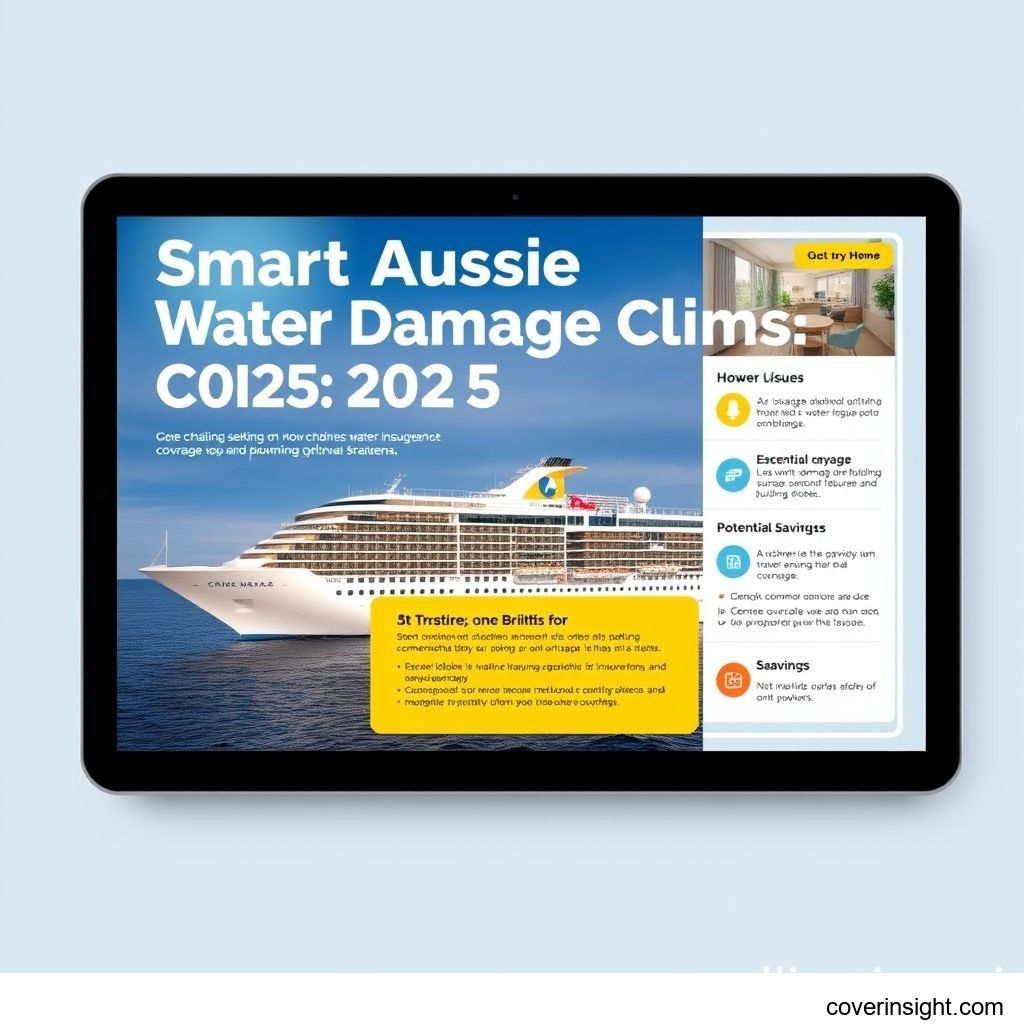Introduction
As Australia gears up for Cyclone Season 2025, understanding the nuances of travel insurance becomes more critical than ever. Whether you're planning a domestic holiday to the Queensland coast or an international adventure, comprehensive travel insurance provides an essential safety net against unforeseen events, including severe weather impacts like cyclones, which can cause significant water damage. This guide will walk you through smart tips for navigating water damage claims and ensuring your policy adequately protects your travel investments in the coming year.
Coverage Details for Your Travel Insurance
Securing the right travel insurance policy is paramount, especially when anticipating the unpredictability of cyclone season. Knowing precisely what your policy covers, and more importantly, what it doesn't, can save you considerable stress and financial loss.
What’s Included
Standard travel insurance policies often include a range of protections designed to mitigate risks associated with travel. When it comes to water damage and severe weather, look for coverage that addresses:
-
Trip Cancellation or Interruption: If your trip is cancelled or cut short due to natural disasters like cyclones, leading to unrecoverable costs for flights, accommodation, or pre-paid tours.
-
Accommodation Expenses: Coverage for alternative accommodation if your pre-booked stay becomes uninhabitable due to water damage from a cyclone.
-
Emergency Medical Expenses: Should you sustain injuries directly related to a weather event, your policy typically covers medical treatment, hospitalization, and emergency evacuation.
-
Baggage and Personal Effects: Protection for your belongings, including electronic devices, if they are lost, damaged, or destroyed by water due to an insured event.
-
Travel Delay: Reimbursement for additional expenses (e.g., meals, accommodation) incurred due to delays caused by adverse weather conditions.
-
Rental Vehicle Excess: Some policies may cover the excess if your rental car is damaged by an insured event, including water damage from flooding.
-
Emergency Assistance: Access to a 24/7 hotline for help with rebooking, medical emergencies, or other travel disruptions.
It's crucial to review the Product Disclosure Statement (PDS) carefully to confirm these specific inclusions, as coverage can vary widely between providers and policy types.
Common Exclusions
Understanding exclusions is just as important as knowing what’s covered. Many travel insurance policies have specific conditions related to natural disasters and water damage:
-
Pre-Existing Conditions/Known Events: If a cyclone has already been named or its impact is widely known before you purchase your policy, damage or disruption stemming from that event may be excluded. Always check the insurer's cut-off dates for purchasing coverage related to named events.
-
Unattended Property: Damage to belongings left unattended, especially in areas prone to water ingress, might not be covered.
-
Lack of Reasonable Care: If you fail to take reasonable steps to protect your property (e.g., leaving windows open during a storm warning), your claim may be denied.
-
Voluntary Exposure to Risk: Engaging in activities or travelling to areas against official government warnings (e.g., Smartraveller advisories) could void your coverage.
-
Property Damage Only: Some basic policies primarily focus on personal injury and trip disruption, with limited or no coverage for damage to personal property or the property you are staying in (e.g., a holiday rental). This is where specific water damage clauses are vital.
-
Commercial Use: If the travel is for commercial purposes or the property is a commercial venture, it might require a different type of insurance.
Always ensure your policy aligns with your travel plans and the potential risks of your destination. For specific details on what constitutes reasonable care or known events, consult the Insurance Council of Australia resources.
Preparing for Cyclone Season 2025
Effective cyclone season preparation is not just about boarding up windows; it’s also about preparing your travel plans and understanding your travel insurance policy. Proactive measures can significantly reduce risks and facilitate smoother claims processes if the unexpected occurs.
Assessing Your Risk
Before finalising your travel plans, especially for destinations within Australia's cyclone-prone regions, it's wise to assess the risk.
-
Understand Regional Vulnerability: Familiarise yourself with the typical paths and intensity of cyclones in your chosen destination. Regions like Far North Queensland, the Northern Territory, and parts of Western Australia are particularly susceptible.
-
Monitor Official Warnings: Stay updated with information from the Bureau of Meteorology (BOM) and local emergency services. Their warnings are crucial for assessing the real-time risk.
-
Review Historical Data: Look at past cyclone impacts on your destination. This can provide insight into the potential for flooding and infrastructure damage.
Pre-Trip Checks
Beyond assessing the general risk, several specific checks can enhance your cyclone season preparation and ensure your travel insurance remains valid.
-
Policy Purchase Timing: Purchase your travel insurance well in advance of your trip and, critically, before any cyclone is officially named or becomes a "known event" by your insurer. Buying last minute may leave you unprotected.
-
Read Your PDS Thoroughly: Pay special attention to clauses regarding natural disasters, severe weather, and water damage. Understand the definitions of these events as per your insurer.
-
Emergency Contacts: Ensure you have your insurer's 24/7 emergency assistance number saved, along with local emergency services and your accommodation details.
-
Digital Copies: Store digital copies of your policy documents, passports, and other vital identification on a cloud service or send them to a trusted contact.
-
Secure Belongings: If staying in a self-contained unit, ensure valuables are stored safely, ideally off the floor, especially if there's a risk of water ingress.
Making Your Travel Insurance Claim
When a water damage event occurs during your trip, knowing how to make a claim effectively can significantly speed up the process and improve your chances of a successful outcome.
Documentation is Key
The success of your travel insurance claim often hinges on the quality and completeness of your documentation.
-
Report the Incident Promptly: As soon as damage occurs, report it to your accommodation provider, local authorities, or the appropriate party (e.g., rental car company). Obtain a written report or incident number if possible.
-
Photographic/Video Evidence: Take clear photos and videos of the damage, focusing on the extent of the water ingress and any affected belongings. Include timestamps if possible.
-
Keep Receipts: Retain receipts for all damaged items and any unexpected expenses incurred due to the incident (e.g., emergency accommodation, alternative transport).
-
Communication Records: Keep a log of all communications with your insurer, including dates, times, and names of representatives spoken to.
Understanding Your Policy
Before submitting your claim, re-familiarise yourself with your policy’s specific requirements.
-
Notification Period: Be aware of the timeframe within which you need to notify your insurer of an incident. Delays can sometimes jeopardise your claim.
-
Excess Amounts: Understand the excess (deductible) you will need to pay for each claim.
-
Claim Forms: Complete all necessary claim forms accurately and provide all requested documentation. Be honest and thorough in your descriptions.
-
Patience and Persistence: Claims, especially those involving complex events like natural disasters, can take time to process. Be patient but persistent in following up if necessary. For general consumer rights related to insurance, you can refer to resources from the Australian Prudential Regulation Authority.
Understanding Travel Insurance Costs
The cost of travel insurance can vary significantly based on a multitude of factors. Understanding these elements can help you make an informed decision and potentially find ways to save money without compromising essential coverage.
Price Factors
Several key elements influence the premium for your travel insurance policy:
-
Destination: Travel to regions with higher medical costs or greater political instability, or those prone to natural disasters, often incurs higher premiums.
-
Duration of Trip: Longer trips generally mean higher costs, as the period of exposure to potential risks increases.
-
Age of Traveller: Older travellers typically face higher premiums due to increased health risks and potential for medical claims.
-
Coverage Level: Comprehensive policies with higher benefit limits and broader inclusions (like extensive water damage coverage) will cost more than basic policies.
-
Pre-Existing Medical Conditions: Undisclosed or unapproved pre-existing conditions can significantly raise premiums or lead to claims being denied.
-
Activities Planned: Participation in adventure sports or high-risk activities usually requires additional coverage at a higher cost.
-
Chosen Excess: Opting for a higher excess (the amount you pay upfront on a claim) can reduce your premium, but means you pay more out-of-pocket if you claim.
Saving Tips
While it's not advisable to skimp on crucial coverage, there are smart ways to save on your travel insurance premium:
-
Compare Policies: Use comparison websites to get quotes from multiple insurers. Don't just look at price; compare what's included.
-
Annual Multi-Trip Policy: If you travel frequently, an annual multi-trip policy can be more cost-effective than buying single-trip policies each time.
-
Group or Family Policies: Travelling with family? A single family policy might be cheaper than individual policies.
-
Only Pay for What You Need: Avoid adding unnecessary riders (e.g., snow sports coverage if you're not skiing).
-
Consider Bundling: Some financial institutions or credit card providers offer complimentary travel insurance. While convenient, always check the PDS of these policies rigorously, as their coverage can be very basic.
-
Look for Deals: Insurers sometimes offer discounts during promotional periods.
-
Factor into Retirement Planning Insurance: For those engaging in retirement planning insurance, consider how travel coverage fits into your broader financial protection strategy. Sometimes, existing policies (like home and contents or health insurance) might offer limited travel benefits, which can inform your standalone travel insurance purchase. A holistic approach to retirement planning insurance includes assessing all your insurance needs, from health to travel, to ensure comprehensive coverage without overlaps or gaps.
Frequently Asked Questions About Travel Insurance
Navigating the world of travel insurance can raise many questions. Here are some of the most common ones, providing clarity on essential aspects of coverage.
How much does travel insurance cost?
The cost of travel insurance varies widely. For a short domestic trip, it might be as low as $30-$50. For a comprehensive international policy, especially for longer durations or older travellers, it could range from a few hundred dollars to over a thousand. Factors like your age, destination, trip length, and chosen level of coverage significantly influence the final premium. Comparing quotes is the best way to get an accurate estimate.
What affects travel insurance premiums?
Several key factors determine travel insurance premiums:
-
Age of the traveller: Older individuals typically pay more.
-
Destination: High-risk countries or regions with expensive medical care increase costs.
-
Trip duration: Longer trips mean higher premiums.
-
Coverage level: Basic policies are cheaper than comprehensive ones.
-
Pre-existing medical conditions: These almost always increase the premium.
-
Activities: High-risk sports or activities can incur extra charges.
-
Excess amount: A higher excess reduces the premium.
Is travel insurance mandatory for AU trips?
No, travel insurance is not legally mandatory for domestic trips within Australia. However, it is highly recommended. While Medicare covers medical emergencies for Australian citizens and permanent residents, it does not cover trip cancellations, lost luggage, or emergency air ambulance transfers between states, which can be very costly. Especially during cyclone season, having travel insurance provides essential financial protection against weather-related disruptions and water damage claims.
How to choose the best travel insurance?
Choosing the best travel insurance involves considering your specific needs:
-
Assess your risks: Consider your health, destination's safety, and planned activities.
-
Read the PDS: Understand what's covered (and excluded), benefit limits, and excesses.
-
Compare quotes: Use reputable comparison sites and direct insurer quotes.
-
Check customer reviews: Look for insurers with good reputations for customer service and claims handling.
-
Consider your budget: Balance cost with adequate coverage.
-
Look for 24/7 assistance: Essential for emergencies while abroad.
You can explore more options and information on the Explore travel insurance Category page.
Consequences of no travel insurance coverage?
The consequences of not having travel insurance can be severe:
-
Significant financial loss: You would bear the full cost of medical emergencies (especially overseas), trip cancellations, lost luggage, or unexpected accommodation expenses due to events like cyclones.
-
No support in emergencies: Without insurance, you lack access to 24/7 emergency assistance lines, which can be critical for navigating medical crises or travel disruptions.
-
Debt: Unforeseen events, like a serious injury or evacuation, can lead to tens of thousands of dollars in debt.
-
Trip disruption: There's no financial safety net for things like missed connections or unexpected accommodation costs due to delays or natural disasters.
For comprehensive resources on insurance topics, visit Insurance Resources Global.
Ensuring you have adequate travel insurance is a cornerstone of responsible travel, particularly when heading into Australia’s unpredictable cyclone season. By understanding your policy, preparing thoroughly, and knowing how to make a claim, you can travel with greater peace of mind in 2025.








Comments